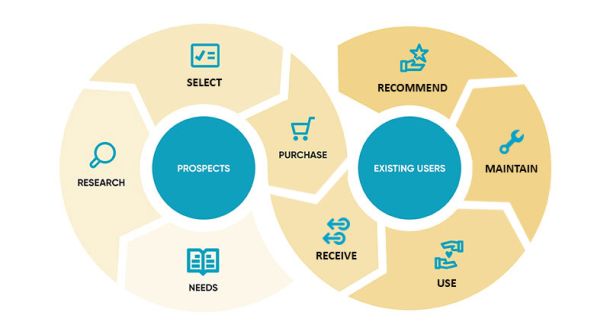
What is Marketing Automation?

What is Marketing Automation?
Among all the specialists engaged in marketing automation, you will meet not only the position of Marketing Automation Specialist, but also Customer Marketing Specialists, CRM Specialists, Customer Experience Specialists (so-called CX Specialists), and Growth Marketing Managers. Why is it so and what all these people can do?! Let’s figure it out.
Marketing Automation is about optimizing a company’s marketing and sales processes. It is a collective name for processes and software (platforms and technologies) that help automate digital marketing and create lead generation and customer segmentation. With marketing automation, we replace manual, typical, recurring marketing activities and processes with systems. We enable automatic and individually directed communication to customers based on their digital footprint (send and receive information between different systems using automatic flows). Each company has its marketing automation, everyone understands it differently, uses their programs, and platforms, and configures them diversly. Therefore, experts in this field in two different companies will never do the same thing.
What’s great is that there is a huge number of free resources, so today marketing automation is available to companies with any budget. In April 2020, according to chiefmartec.com, there were already more than 8000 companies providing tools, software, and platforms for automation and optimization. And in 2022 it’s almost 10000!
The biggest advantages of marketing automation are the implementation of targeted communication, better customer experience, getting more leads with higher quality, and more ROI on activities. Marketing automation makes it possible to reach out with the right message to the right person at the right time. It is often used along with a lifecycle marketing strategy to closely manage, and nurture generated leads, aiming to convert them into real customers. We can better analyze data, test hypotheses, evaluate results, and optimize processes more. The question is precisely the competencies and the correct configuration and selection of the necessary channels and messages. This is where a marketing automation specialist can help.
In a more scientific language, we can distinguish the following areas of functionality for marketing automation solutions:
- Content creation and promotion
- Marketing Campaign Management
- Lead management
- Measuring results
One of the most important pillars of Marketing Automation is the customer journey. The Customer Journey consists of eight stages and is visualised with a Customer Journey Infinity loop. The first stage is Need, then we move forward to the stage of Research, then Select, Purchase, Receive, Use, Maintain, and finally Recommend.
Thus, Marketing Automation is not just about setting up technological processes. To ensure the best customer experience, we should define our target audience, describe it in detail and define a Buyer Persona. Buyer Persona is a semi-fictional representative of your target market and is present for both B2C and B2B markets. Look at their demographic and psychographic characteristics, behavior patterns, and only then work with the needs.
An interesting step here is the creation of Story Mapping. Each stage of the Customer Journey can be represented by a separate story about how our consumer interacts with the product and the company. Only by describing this process and the touchpoints, we can identify potential channels of interaction and then automate work with the client for the best and most effective result.
In this way, a Marketing Automation Specialist is likely to have competencies in marketing technologies, data analysis, testing and conversion optimization, and data-driven strategy building. Also, he will know coding like basic HTML, CSS, JavaScript, and basics in statistics for doing data analysis. Among more specific abilities can be distinguished the experience in presentation techniques, agile project management, copywriting, CMS, setting up campaigns through a huge number of different channels, A/B testing, and Google Analytics.


